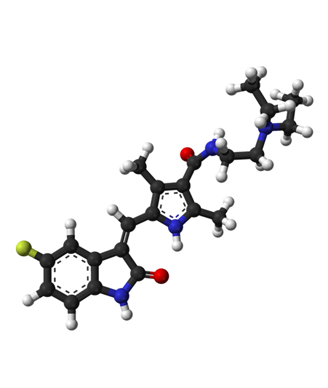Sunitinib-Related Fatigue Occurs Early in RCC Treatment
Patients receiving treatment with sunitinib for advanced renal cell carcinoma experienced worse treatment-related fatigue during the first cycle of treatment with symptoms lessening after subsequent consecutive cycles.
Ball-and-stick model of sunitinib

Patients receiving treatment with sunitinib for advanced renal cell carcinoma experienced worse treatment-related fatigue during the first cycle of treatment with symptoms lessening after subsequent consecutive cycles, according to the results of a recent study.
“The finding that sunitinib-related fatigue occurs early can be used to enhance education and preparedness among patients who have been prescribed sunitinib for the treatment of advanced renal cell carcinoma,” wrote David Cella, PhD, of Northwestern University Feinberg School of Medicine, and colleagues. “It also highlights the importance of setting upfront expectations regarding the fatigue experience so that patients do not prematurely withdraw from treatment, thereby failing to take advantage of the potential clinical benefit of sunitinib.”
Fatigue is a common problem in patients with advanced cancer assigned treatment with interferon or targeted therapies, such as those commonly used for the treatment of advanced renal cell carcinoma. Previous research has shown that fatigue is reported in as many as 40% to 70% of patients with advanced renal cell disease in clinical trials of sunitinib.
The researchers sought to analyze sunitinib-related fatigue and any effect it has on health-related quality of life. Using data from a phase III trial of sunitinib compared with interferon-alpha in patients with metastatic disease, Cella and colleagues assessed health-related quality of life using the Functional Assessment of Cancer Therapy-Kidney Symptom Index 15-item (FKSI-15) questionnaire, and fatigue using its Disease Related Symptoms subscale (FKSI-DRS) and Common Terminology Criteria for Adverse Events (CTAE).
The researchers then used a repeated-measures model (M1) and a random intercept-slope model (M2) to characterize sunitinib-associated fatigue over time.
The M1 model showed that results of the FKSI-DRS item indicated an increase in patient-reported fatigue during the first cycle of sunitinib. However, fatigue values for the subsequent cycles were numerically better that that of the first.
“Most pairwise comparisons of consecutive CTCAE fatigue cycle means were not found to be statistically significant,” the researchers wrote.
Results from the M2 model supported this finding showing that fatigue was stable over time after the initial increase seen after the first cycle of sunitinib.
Looking at health-related quality of life, the researchers found that the relationship between most quality-of-life outcomes and CTCAE was close to linear regardless of whether the patient was treated with sunitinib or interferon-alpha. As expected, worse health-related quality-of-life scores were found with a higher mean fatigue grade, except for measures that were not linked directly to fatigue such as those related to bone pain.
When looking at the results excluding fatigue, health-related quality of life according to CTCAE was numerically superior with sunitinib compared with interferon-alpha, with a statistically significant difference in most cases.
“Findings similar to those of the current study may have been reported anecdotally by some clinicians, given their experience with sunitinib, but to the best of our knowledge the current study is the first formal analysis to confirm and quantify this observation,” the researchers wrote.
2 Commerce Drive
Cranbury, NJ 08512
All rights reserved.